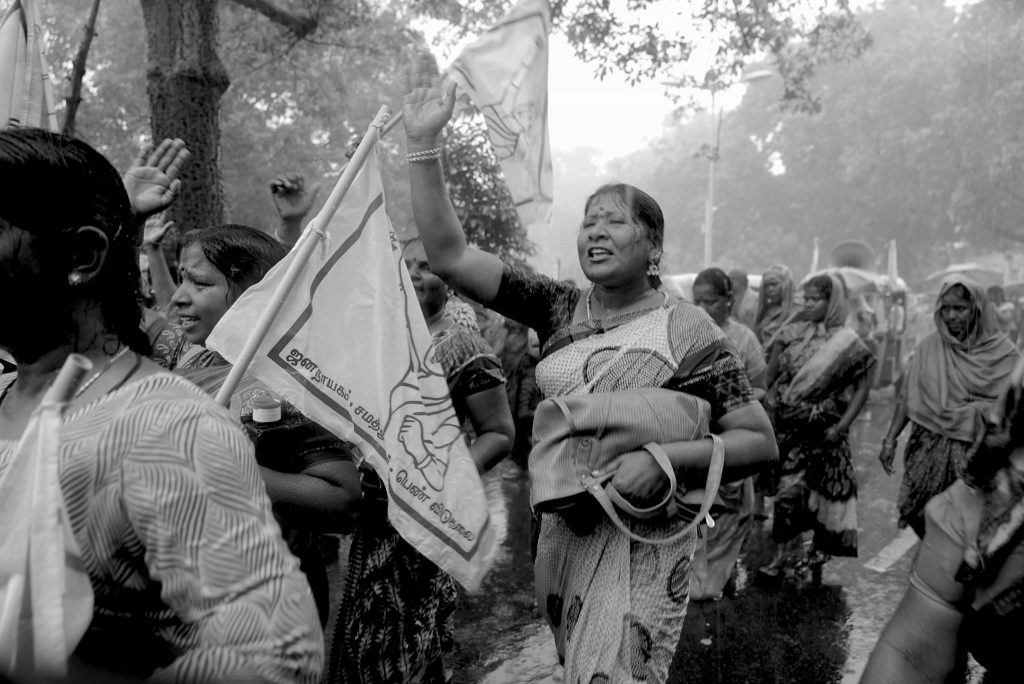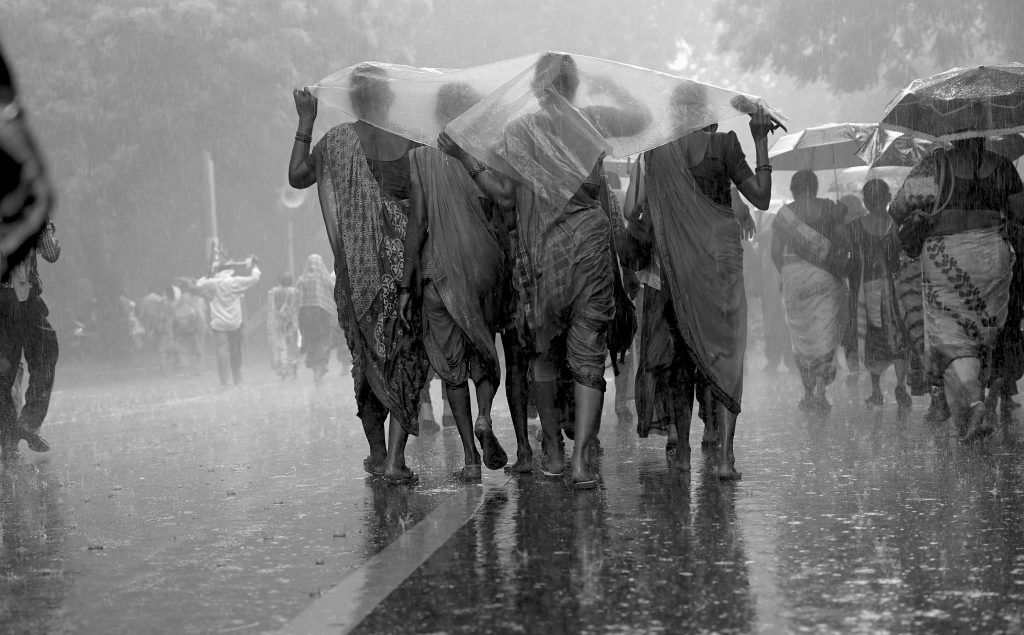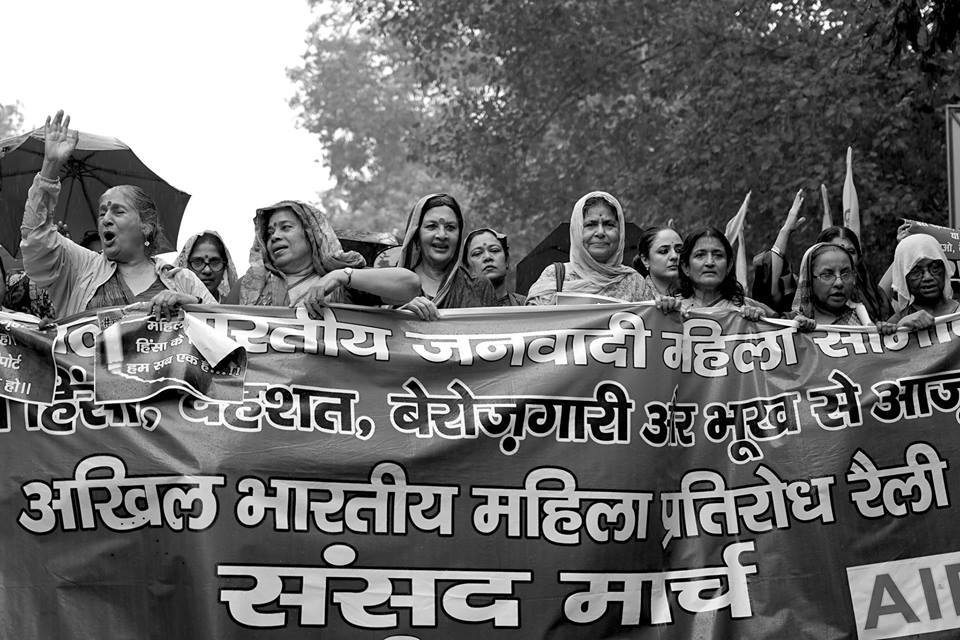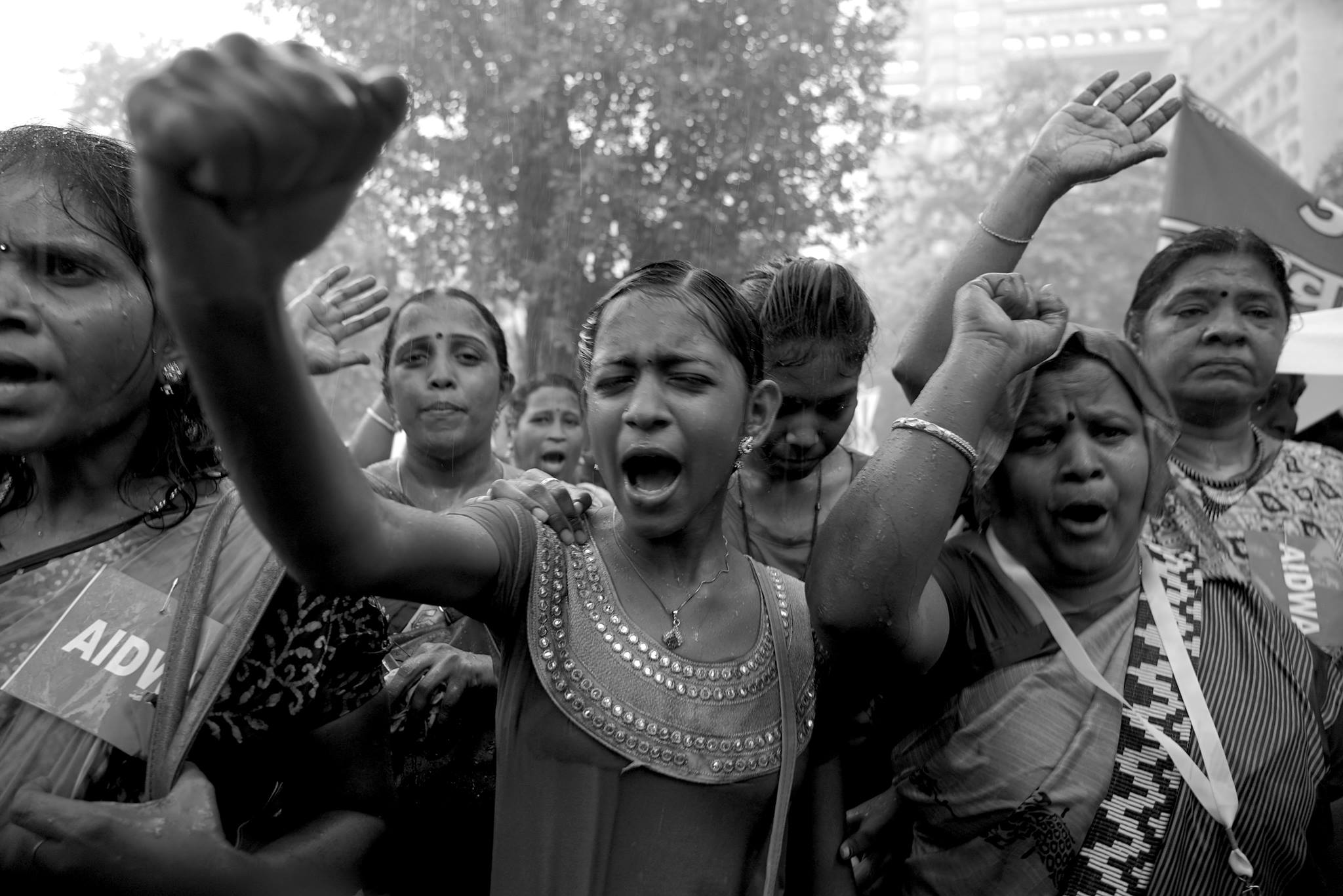About 6,000-8,000 women from various States in India converged in the capital city of New Delhi, and marched to Parliament Street on September 4. They were protesting the increase in atrocities against women under the current government led by the far-right Bharatiya Janata Party (BJP), many of whose leaders have on multiple occasions come out in defense of the alleged perpetrators of brutal sexual violence.
From 20 different States, the women activists – led by the leftist mass organization All India Democratic Women’s Association (AIDWA) – arrived at four different railway stations in the capital city throughout the day on September 3. While a majority of them arrived from States in northern and central India, about 1,500 women also came from the eastern state of Bihar and another 3,000 from the western State of Maharashtra, both of which are over a 1,000 kilometers away from Delhi.
Having spent the night resting on the platforms of railways stations, the women converged before noon on a street about 3 kilometers from the parliament to begin the march. Minutes into the march, as heavy rain broke out, a few opened umbrellas, while some others held up long tarpaulin sheets under which five or six activists marched together in a file.
Pointing out that there was an 85% spike in the cases of rape of women and children in 2016, AIDWA said in its statement that this increase was not random but was in fact, systemic. The current government came to power in 2014.
“The frightening regularity with which women and young girls are subjected to violence and abuse in various parts of the country, is a matter of serious concern. Gang rape, abduction, physical and mental abuse, torture of various kinds and threats of killing and rape are not isolated incidents. Instead, they are part of the larger systemic problem. Concerted efforts have been made in the recent past by certain political groups to show women their ‘true place’. With the political patronage of the BJP-RSS, there has definitely been a spurt in the number and brutality of such incidents against women” the statement said.
The ideology of the ruling dispensation, which demands that the clothing and lifestyle of Indian women be along the lines dictated by tradition, also targets those who do not fall in line and subjects them to victim blaming. In the name of criticizing a woman’s dressing style, her motives behind being out of her house late at night, among others, are questioned.

Addressing the gathering, Brinda Karat, a founding member of AIDWA and member of the Polit Bureau of the Communist Party of India (Marxist), warned that the BJP government had launched a systematic attack on democracy, which it intended to replace with the ‘Rule of Manu’. Manu is believed to be the author of the ancient text, the Manusmriti, which depicts women as a “dangerous temptation”, who must be kept under strict control by the men at all time.
The text is infamous for its recommendation that “nothing must be done independently” by a woman of any age “even in her own house..In childhood, a female must be subject to her father, in youth to her husband, when her lord is dead to her sons; a woman must never be independent.”
Disparaging the Indian constitution for not incorporating these rules of Manu, the largest socio-political-paramilitary organization in south Asia, the RSS, had soon after independence, argued in its magazine, “To this day, his laws as enunciated in the Manusmriti, excite the admiration of the world and elicit spontaneous obedience and conformity. But to our constitutional pundits that means nothing.” The ruling BJP is the political arm of the RSS and the current Prime Minister Narendra Modi is a senior member of the organization.
“Our rights come from our constitution, not from your reactionary traditional diktats,” Brinda Karat said, referring to the BJP leaders in her address, after asserting that the women of the country would not allow the ruling party to use religion and tradition to oppress them.
The warning was timely, considering the brazzeness with which members of the ruling party have come out in defense of the accused in heinous cases of sexual violence that have left the nation shocked.
In January, 8-year-old Asifa was abducted, drugged and held in a temple in the State of Jammu and Kashmir for a week, in the course of which she was starved and repeatedly gang-raped, before her head was smashed with a stone and her body thrown in the woods. When the police arrested the suspects and took them to court to file charges, the local bar association, under the leadership of the Hindu Ekta Manch (Hindu Unity Forum) – an organization which shares the ruling party’s ideology – blocked the entrance to the court to stop the filing of the chargesheet.

Days later, two State cabinet ministers from the BJP attended a rally taken out by the Hindu Ekta Manch in defense of the arrested. The fact that the victim was a Muslim was sufficient grounds for these groups to imply that it was a conspiracy to defame Hindus.
Addressing the demonstration, Deepika Rajawat – the lawyer who is fighting the court case to bring the perpetrators of the crime to justice – said, “It is high time we women break our silence”, adding, “We will confront head-on the government which, in the face of oppression of women, remains a silent bystander.”
Also scheduled to speak at the protest was the uncle of an 18-year-old woman who was raped in the State of Uttar Pradesh (UP), allegedly by a BJP member of the State legislature and his brothers. When her complaint was not heeded by the police, she and some of her family members attempted to commit suicide before the State’s Chief Minister’s residence in protest.
The UP Chief Minister, known to be one of most extreme fanatics in the BJP fold, has numerous criminal cases against him. He was also filmed sitting on a stage before a mass gathering while his henchman, riling up the crowd to attack the Muslims in the region, called on them to dig up the wives and sisters of Muslims from their graves and rape their dead bodies.
The protest-suicide attempt before the CM’s residence was foiled by the police, who later arrested the victim’s father based a counter-complaint by the accused. Days later, the woman’s father died in police custody, allegedly after suffering severe wounds while being tortured by police personnel and goons of the accused BJP member.
The victim’s uncle, Mahesh Singh Makhi, who continues the family’s fight for justice in courts, despite threats to his life and liberty, could not make it to the rally. Subhashini Ali – vice-president of AIDWA and member of CPI(M) – commended him for his courage, and pointed out that even though the BJP leader had been arrested, the party has not suspended him.

Another key issue which was highlighted at the rally was the impact of political violence on women. Vinita Chaudhari, an AIDWA activist from the northeastern state of Tripura, was one of the victims injured in the political violence launched by BJP supporters and workers in the State, after defeating the leftist coalition led by the CPI(M) in the election this year. In this violent assault, 500 workers associated with the party and its mass fronts were injured, over 1,000 homes attacked and over 350 party offices ransacked. After recounting the assault, she firmly asserted that the women activists would not back down.
The rally also celebrated the successes of AIDWA workers’ struggles in the States of Maharashtra and Bihar. The participants of the struggles recounted their experiences and vowed to continue the fight to end hunger and exploitation and to secure the basic rights of employment and dignity for all Indians.
After a day of agitation in the rain, following the long journey from different parts of the country and a short nap on railway platforms at night, the women joined the massive protest on September 5, when hundreds of thousands of farmers, workers and agricultural workers marched to Parliament Street to confront the anti-people policies of the government.





